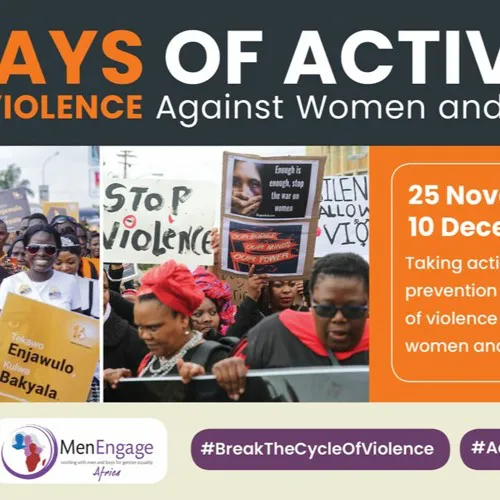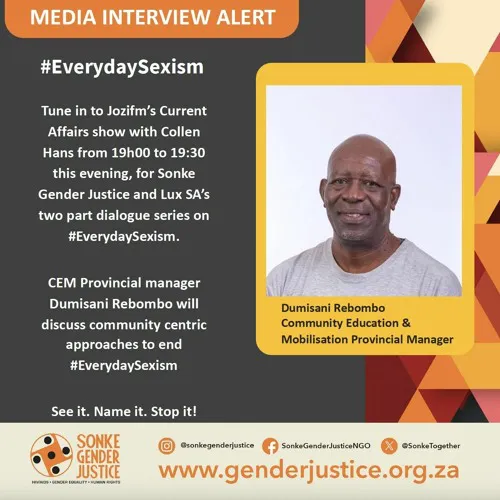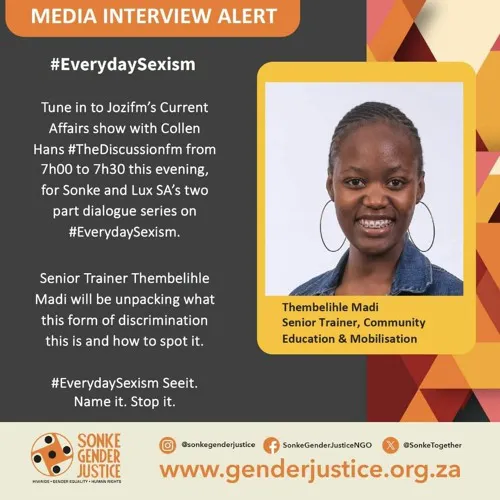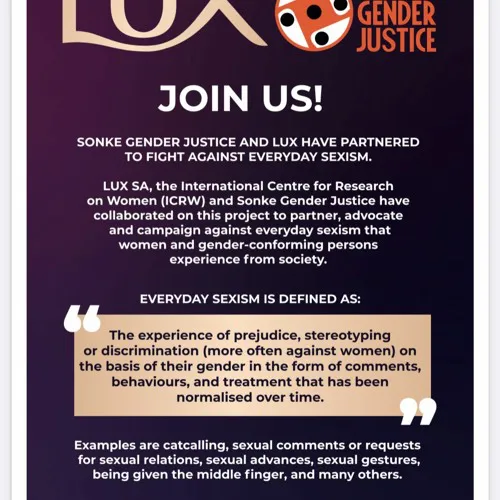Produced in 2013 and released for radio broadcast in November of that year – just in time for the 16 Days of Activism – the three-part radio drama series, Change the Story: Refugees and Migrants Speak Against GBV, highlights factors that make refugees and migrant communities vulnerable to sexual violence as well as challenges for accessing care and treatment services. While all women and girls face challenges reporting any kind of violence, refugees and migrants face added barriers of language, lack of knowledge of local systems and rights, not knowing where to go, few support systems, and at times, xenophobic responses.
One of the key responses of the South African government to sexual violence has been the establishment of Thuthuzela Care Centres (TCCs) under the Department of Justice and Constitutional Development. The TCCs are innovative one-stop facilities offering comprehensive services to victims of sexual violence. To help promote awareness, encourage dialogue, and urge care seeking among migrants and refugees, Sonke Gender Justice and Community Media for Development (CMFD) Productions worked with 20 refugees, migrants and South Africans to develop, write, and voice the three mini-dramas.
“We created the storylines based on the real life experiences told during the workshop – about what they have experienced themselves, what has happened to their friends and family members,” says Deborah Walter of CMFD Productions. “The mixed group of South Africans and non-South Africans stood together to say no to gender violence, no to sexual violence and domestic abuse. Working together, we can change the stories, to create a norm where violence is no longer tolerated, regardless of where anyone is from.”
In the first drama, “Leaving Home: Facing Sexual Harassment,” Chipo travels to a neighbouring country to help support her impoverished family. However, things turn sour for her when her boss starts sexually harassing her, and then worse. She remains quiet about the ongoing rape and violence until a neighbour speaks up to direct her to a nearby TCC.
In “I have the right: Reporting a Case,” Lerato and Ellen turn to the police to help stop violence in their homes. Officer Katlego is unhelpful, but also xenophobic towards Ellen. In the end, they both find the help they need when another officer steps in. In the last drama, “Dangerous Borders: Vulnerable in Transit”, Lisa flees her abusive uncle, the person whom she has lived with since the day her parents were killed in the violence that has caused havoc in her country. On the road, she is sexually assaulted by a taxi driver, and the psychological trauma remains long after her bruises have healed.
Aime Emmanuel Luboya, a refugee from Burundi, is a community member who supports Sonke Gender Justice’s Refugee Health and Rights Project. “The dramas will help people to know that violence is not good,” he says about the project. “Everyone must get to know his or her rights, whether refugees, migrants or South Africans.”
For Cindy Adeolow from Nigeria, also a member of a community action team of Sonke’s Refugee Health and Rights Project, taking part in the drama project is a chance to help her community. “So many people are suffering as they don’t know where to get help when they are in situations like these,” she says. “We must all work together and get help from the right people who are able to help us.”
BELOW ARE ALL THREE EPISODES OF THE SERIES:
Part 1: Leaving Home – Facing Sexual Harassment
In this first episode of Change the Story: Refugees and Migrants Speak Against GBV, Chipo leaves home, leaving behind the brothers and sisters she cares for to travel to a neighbouring country in search of work so that she can send money back home for food and other necessities for their well-being. However, things turn sour for her when her boss starts taking advantage of her vulnerable position. With no friends or family, not knowing the country and difficulty speaking the language, she remains quiet about the ongoing rape and violence. She gets help from a neighbour who has information about a nearby Thuthuzela Care Centre (TCC).
Change the Story: Refugees and Migrants Speak Against GBV was released in November 2013, just ahead of the 16 Days of Activism for No Violence Against Women and Children of that year. This three-part series of short radio dramas highlights factors that make refugees and migrant communities vulnerable to sexual violence as well as challenges for accessing care and treatment services. While all women and girls face challenges reporting any kind of violence, refugees and migrants face added barriers of language, lack of knowledge of local systems and rights, not knowing where to go, few support systems, and at times, xenophobic responses.
Part 2: I Have the Right – Reporting a Case
After being assaulted by her husband, Lerato turns to her local police station for help. The first police officer she encounters, Officer Katlego, isn’t very helpful at all, but a second, Officer Malumane, passes by while she is recounting the story and takes the issue seriously. When Ellen, who is not from South Africa, is physically and sexually assaulted by her husband, she also turns to the police for help. Officer Katlego is not only again unhelpful, but also xenophobic, threatening Ellen with arrest. Scared, she flees, and meets her friend Lerato on the way out, who then helps her to contact the people in the station who will assist her. Although they both receive help in their situations, Ellen’s journey is longer and more difficult.
Part 3: Dangerous Borders – Vulnerable in Transit
This is the third and final episode of the three-part radio drama series, Change the Story: Refugees and Migrants Speak Against GBV, which highlights factors that make refugees and migrant communities vulnerable to sexual violence as well as challenges for accessing care and treatment services.
This episode tells the story of Lisa, a 23-year old young woman living with her paternal uncle who has taken care of her since the day her parents were killed in the violence that has caused havoc in her country. Once kind and caring, over the years the uncle has become very abusive, treats her badly, and has begun to make sexual advances. One day after an altercation, tired and beaten, she flees to try to find a new life in South Africa. Along the way she is raped by a taxi driver. She is lucky to find help from someone at home once she reaches her destination, but the psychological trauma remains long after her bruises have healed.
THE DRAMAS ARE ACCOMPANIED BY A SERIES OF DISCUSSION GUIDES FOR RADIO PRESENTERS TO HELP THEM CREATE STORIES AND REPORTS AROUND THE ISSUES, HOST DISCUSSIONS, ASK QUESTIONS AND PRESENT ACCURATE FACTS.
Download these resource materials here:







